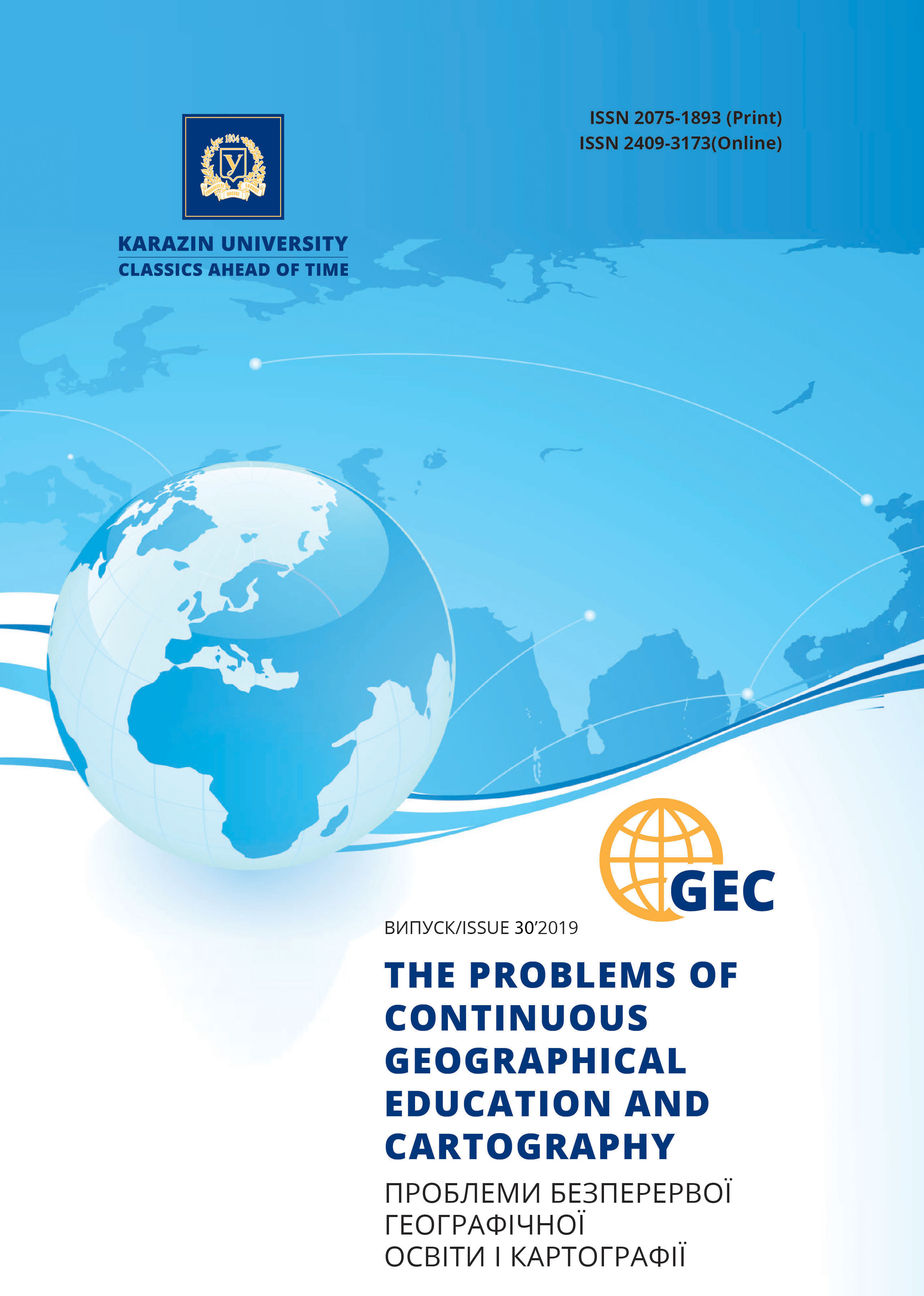Capacity of reforms efficiency of administrative and territorial structure (the case of Zaporizhzhia region)
Abstract
The aim of the article is to examine efficiency of the decentralization process` potential and the conditions for the formation of financially capable and self-sufficient united territorial communities (UTCs) on the basis of sustainable development of territories and national economy alike.
Main material. Efficiency of the decentralization process in Zaporizhzhia region has been analyzed in the article. The methodology of UTCs clustering by the level of their financial capacity applying statistical indicators of relative frequency and frequency with the subsequent determination of the confidence interval for mean observations (with probability of 0.95) has been proposed.
The following have been chosen as the clustering criteria: income per capita; personal income per capita; infrastructure grant per capita and development expenditure (capital expenditure) per capita. Each set was divided into three groups: the first group of UTCs is from the minimum value to the lower limit of the confidence interval; the second group of UTCs is within the confidence interval; the third group of UTCs is above the upper limit of the confidence interval. It has been found out that the main determinants of UTCs formation of financial capacity and self-sufficiency are the following: natural-geographical (land, forest, water, mineral, biological, energy) and socio-economic (material, financial, human and
intangible) resources. Econometric modeling of financial capacity level of UTCs in Zaporizhzhia region has been conducted.
Conclusions and further research. The methodology of UTCs clustering by the level of their financial capacity according to the following criteria has been proposed: income per capita; personal income per capita; infrastructure grant per capita and development expenditure (capital expenditure) per capita. It has been used to evaluate efficiency of the decentralization process in Zaporizhzhia region.
The main determinants of UTCs financial capacity and self-sufficiency formation has been proved. Regression econometric models have been built to evaluate its development potential and forecasting for UTCs of Zaporizhzhia region.
The authors have proved that nowadays there are territories facing the process of UTCs formation. It has been demonstrated in the study that the complex potential of territorial development, namely, natural and socio-economic potentials, should be the basis for the further UTCs formation. The gradients (as the territorially defined set of opportunities) of the complex development potential will form UTCs administrative delimitation (territorial coverage). UTCs will have characteristics like economic capacity and efficient development based on the resources`, interests` and competitiveness` harmony.
It has been proved that in the further process of decentralization it is advantageous to carry out UTCs clustering. UTCs should become clusters` centers of gravity (clusters` cores) as they have reached satisfactory financial capacity and selfsufficiency at the voluntary stage of decentralization.
Downloads
References
Ukaz Prezy`denta Ukrayiny` «Pro Strategiyu stalogo rozvy`tku «Ukrayina–2020» (vid 12 sichnya 2015 r., № 5/2015) [Decree of the President of Ukraine «On the Strategy of Sustainable Development «Ukraine-2020» (from January 12, 2015, № 5/2015). Available at: http://zakon5.rada.gov.ua/laws/show/5/2015
Tery`torial`na gromada yak bazova lanka administraty`vno-tery`torial`nogo ustroyu Ukrayiny`: problemy` ta perspekty`vy` reformuvannya (2016) [Territorial community as a base part of the administrative-territorial device of Ukraine: problems and prospects of reforming]. Ky`yiv: NISD, 61.
Batanov, O.V. (2008). Tery`torial`na gromada – pervy`nny`j sub'yekt municy`pal`noyi vlady` v Ukrayini: ponyattya ta oznaky` [A territorial community - primary subject of municipal authority in Ukraine: concept and attribute]. Available at: http://www.cvk.gov.ua/visnyk/pdf/2008_2/visnik_st_13.pdf
Murkovy`ch, L. Tery`torial`na gromada yak sub'yekt miscevogo samovryaduvannya v Ukrayini: teorety`chni aspekty` [Territorial community as the subject of local self-management in Ukraine: theoretical aspects]. Available at: http://www.dbuapa.dp.ua/vidavnictvo/2010/2010_02%285%29/10mliuta.pdf
Molodozhen, Yu.B. (2006). Ponyattya i sutnist` tery`torial`noyi gromady` v sy`stemi miscevogo samovryaduvannya Ukrayiny` [Concept and essence of a territorial community in system of local self-management of Ukraine]. University Scientific Notes: Journal of Khmelnitsky University, 2, 128-136.
Rudenko, L.G., Lisovs`ky`j, S.A., Marunyak, Ye.O. (2016). Vy`kly`ky` i zagrozy` prostorovogo rozvy`tku Ukrayiny` na shlyaxu do yevrointegraciyi [Challenges and threats of spatial development of Ukraine on the way to European integration]. Ukrainian Geographical Journal, 1, 41-46.
Goroshkova, L.A., Volkov, V.P., Xloby`stov, Ye.V., Kuty`k, V.V. (2019). Prognosty`chni modeli finansovogo regulyuvannya byudzhetiv tery`torial`ny`x gromad [Prognostic models of financial regulation of territorial communities’ budget ]. Economic Bulletin of Pereyaslav-Khmelnytsky State Pedagogical University, 42, 179-190.
Volkov, V.P., Goroshkova, L.A., Karbivny`chy`j, R.O. (2018). Upravlinnya neruxomistyu tery`torial`ny`x gromad [Management of property of territorial communities]. Belostok: Belostok, 144.
Volkov, V.P., Goroshkova, L.A., Karbivny`chy`j, I.O. (2018). Naukovi zasady` texnologij upravlinnya resursamy` komunal`noyi vlasnosti v umovax reformuvannya [Scientific bases of management technologies of resources of municipal property in the conditions of reforming]. Belostok: Belostok, 138.
Volkov, V.P., Karbivnychyi, I.O, Karbivnychyi, R.O., Horbova, I.A. (2018). Conditions of the no-loss functioning of territorial formation. Вelostok: Вelostok, 190.
Goroshkova, L.A., Volkov, V.P., Karbivny`chy`j, R.O. (2018). Rol` mizhbyudzhetnogo regulyuvannya u finansovij spromozhnosti tery`torial`ny`x gromad [The role of inter-budgetary regulation in the financial capacity of territorial communities]. Bulletin of the Azov State Technical University. Series: Economics, 36, 5-12.
Horoshkova, L., Volkov, V., Kapranova, L., Komelina, А. (2018). The Reverse Subsidy`s Impact of United Territorial Community`s Budget Generations. International Journal of Engineering & Technology, 7 (4.8), 539-543.
Goroshkova, L.A., Volkov, V.P. (2018). Upravlinnya finansovy`my` procesamy` decentralizaciyi ta formuvannya tery`torial`ny`x gromad [Management of financial processes of decentralization and formation of territorial communities]. Economic Bulletin of Pereyaslav-Khmelnitsky State Pedagogical University, 36/1, 285-293.
Xloby`stov, Ye.V., ed. (2016). Derzhavna ekologichna polity`ka Ukrayiny` v umovax decentralizaciyi vlady` [State environmental policy of Ukraine in the context of decentralization of power]. Ky`yiv: Derzhavna ustanova «Insty`tut ekonomiky` pry`rodokory`stuvannya ta stalogo rozvy`tku Nacional`noyi akademiyi nauk Ukrayiny`», 226.
Decentralizaciya [Decentralization]. Available at: http://decentralization.gov.ua/news/7991?page=6
Copyright (c) 2019 Лідія Горошкова, Сергій Лісовський, Євген Хлобистов

This work is licensed under a Creative Commons Attribution 4.0 International License.





